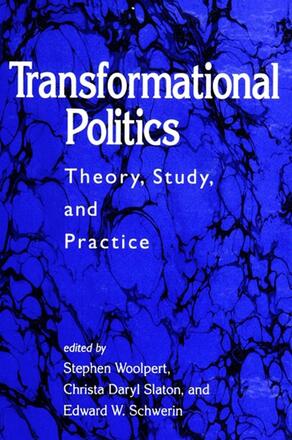
Transformational Politics
Theory, Study, and Practice
Alternative formats available from:
Argues that traditional political science is failing to identify and address fundamental political phenomena of our time and proposes an alternative value-based political science.
Description
Winner of the 1999 Best Book in Ecological and Transformational Politics presented by the American Political Science Association's Section on Ecological and Transformational Politics
The discipline of political science has reached a crossroads. The frequency with which terms such as "post-liberal," "post-modern," "post-patriarchical," "post-materialist," and "post-structural" are used in contemporary political discourse testifies to the pervasive conviction that an era has ended. Similarly, phrases such as "new world order," "new paradigm," "new age," and "third wave" convey the widely-shared expectation that what lies ahead politically will be qualitatively unlike what has gone before. Transformational Politics argues that traditional political science is failing to identify and address fundamental political phenomena of our time and proposes an alternative value-based political science that not only studies phenomena, but also uses knowledge to promote democracy, sustainability, and social conscience.
Part I of the book defines transformational political theory as an emerging paradigm and draws on a wide array of theories—empowerment, feminist, democratic, communitarian, chaos, quantum, conflict resolution, self-actualization. Part II examines how a transformational perspective guides the study of politics in both research and teaching. Part III offers guidance about how to practice the theory and apply the study with a concern for creating a better world.
Stephen Woolpert is Professor of Government at Saint Mary's College of California; Christa Daryl Slaton is Associate Professor of Political Science and Director of the Master in Public Administration Program, Auburn University; and Edward W. Schwerin is Associate Professor and Director of Interdisciplinary Studies, Florida Atlantic University–Davie.
Reviews
"Transformational Politics will primarily interest adherents of the transformational political paradigm, but it may find a large audience among those interested in the Green movement and alternative methods for teaching and research. " — Southeastern Political Review
"The information in this book is cutting edge scholarship. This is the first full-scale attempt to pull together the vision and perspectives of the Transformational Politics group into a coherent statement that can be shared among themselves and with other scholars. The book will be the reference document for this branch of study for some time. " — Lester W. Milbrath, State University of New York at Buffalo, Emeritus
"I am very enthusiastic about the work. As a teacher and a researcher, I found that the book provides rich teaching material and a wonderful synthesis of valuable resources. " — Richard Couto, University of Richmond